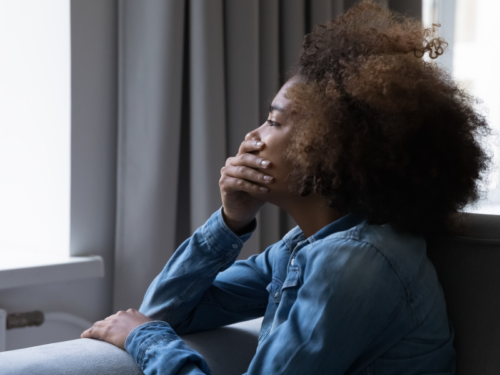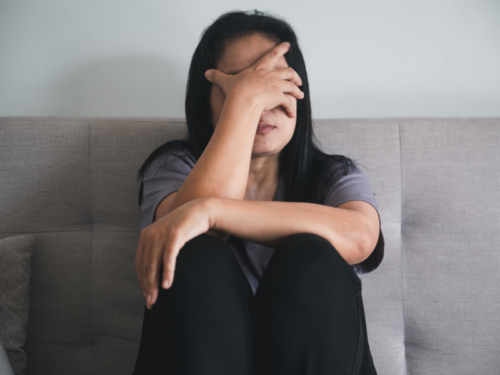
Table of Contents
This Is What PTSD From Childhood Abuse in Adults Looks Like

Written By: Ashley Laderer

Clinically Reviewed By: Dr. Don Gasparini
October 25, 2023
7 min.
Childhood abuse doesn’t just affect children at the time of the abuse—it can cause long-lasting impacts into adulthood, including post-traumatic stress disorder. Read on to learn more.
Learn more about our Clinical Review Process
Table of Contents
While we would hope that all children experience no harm while they grow up, the reality is that not everyone gets a picture-perfect childhood. Sadly, the Centers for Disease Control and Prevention (CDC) estimates that one in seven children has been abused or neglected in the last year. And the actual number is likely higher since many cases of abuse or neglect go unreported.
The impact of childhood trauma isn’t just a matter of the past. Experiencing childhood abuse can result in long-lasting psychological scars that persist well into adulthood, sometimes resulting in post-traumatic stress disorder (PTSD). Here’s what you need to know about PTSD in adults due to childhood abuse, including symptoms and treatment.
PTSD from childhood abuse in adults
The development of PTSD in adulthood from childhood abuse is rooted in the significant impact that trauma has on a child’s brain and overall well-being. Childhood abuse disrupts a child’s sense of safety and trust, leading to long-lasting trauma.
“Imagine childhood as the foundation of a house. If there are cracks in this foundation due to abuse, the entire structure can become unstable,” says Alyssa Scolari, a licensed professional counselor specializing in trauma. “These ‘cracks’ might develop into PTSD as one grows into adulthood.”

Healing from trauma is possible
Get started with Charlie Health’s trauma-informed, virtual mental healthcare today.
Not to mention, trauma results in changes to the brain. Researchers have found that these changes may be even more significant when childhood trauma occurs in a young person while the brain is still developing. These changes can disrupt the normal physiological stress response and affect how chemical messengers in the brain function. Childhood trauma can also impact brain regions such as the prefrontal cortex (involved in mood and emotional regulation, the hippocampus (associated with learning), and the amygdala (related to the fear response).
These brain changes may be associated with symptoms of PTSD or even additional mental health conditions.
Types of child abuse that can cause trauma and ultimately lead to PTSD in adulthood include:
- Physical abuse
- Psychological/emotional abuse
- Sexual abuse
- Neglect
Just because the child abuse happened in the past, it doesn’t mean the impact stays in the past. For many survivors, the abuse becomes deep-seated trauma, impacting them into their teen and adult years. “Think of it as having an old injury that sometimes flares up,” says Scolari. “For many who experienced abuse in their younger years, the past isn’t just a distant memory but an active part of their day-to-day life, influencing feelings, choices, and interactions.”
How common is PTSD from an abusive childhood?
Sexual abuse, physical abuse, emotional abuse, and neglect are some of the most prevalent causes of PTSD in children and young adults. However, PTSD can also occur in adulthood.
PTSD from childhood abuse in adults is sadly common. “Many individuals who faced such trauma in their early years confront its echo in the form of PTSD as adults,” says Scolari. “In fact, research consistently shows that those subjected to childhood maltreatment are considerably more likely to grapple with PTSD symptoms later in life.”
For example, one older study found that the following percentages of victims met diagnostic criteria for PTSD:
- 37.5% of victims of childhood sexual abuse
- 32.7% of victims of childhood physical abuse
- 30.6% of victims of childhood neglect
“However, there’s a silver lining. Not everyone who faces childhood abuse will experience PTSD as adults,” Scolari says. “People are resilient. Factors like therapy, strong friendships, supportive families, or personal coping strategies can change the narrative.”
Symptoms of PTSD
If you have a history of trauma, such as childhood abuse, and symptoms that are getting in the way of your functioning and quality of life, you can likely benefit from a PTSD screening by a mental health professional.
The manifestation of PTSD due to childhood trauma is highly individualized. Not everyone will display the same set of symptoms. Plus, there might be co-occurring mental health conditions that contribute to symptoms, too.
PTSD can cause various mental, cognitive, and physical symptoms. Common PTSD symptoms include:
- Repeated distressing memories of the abuse, making you re-experience the trauma
- Disturbing flashbacks where you feel like the trauma is occurring right now
- Feeling emotionally and/or physically distressed when you’re triggered by something that reminds you of your trauma
- Nightmares about the trauma
- Avoiding places, things, scenarios, thoughts, or memories that remind you of your trauma
- Aggression and irritability
- Acting recklessly or being self-destructive
- Hypervigilance
- Heightened startle response
- Trouble concentrating
- Difficulty with sleep
- Struggling to remember parts of the trauma
- Having drastic negative beliefs about yourself and/or others
- Blaming yourself or others for your trauma
- Constantly feeling negative emotions and struggling to feel positive ones
- Lack of interest in activities you used to enjoy
- Isolation and feeling like you can’t connect with others
- Depersonalization (feeling like you are disconnected from yourself)
- Derealization (feeling like you are disconnected from your surroundings)
Furthermore, it’s important to note that certain types of childhood trauma, such as neglect and emotional abuse, may result in a subtype of PTSD known as complex post-traumatic stress disorder, also known as C-PTSD or complex PTSD. C-PTSD results in the above symptoms as well as “disturbances in self-organization,” sometimes referred to as DSO. Examples of DSO symptoms related to complex trauma are:
- Trouble with emotional regulation
- Difficulties with interpersonal relationships
- Negative self-concept
Signs of repressed childhood trauma in adults
Repressed childhood trauma memories can make it even more challenging to recognize PTSD or complex PTSD. You might experience trauma-related symptoms but not consciously remember experiencing childhood trauma. While some people have no trouble recalling the details of their trauma, others experience repressed memories, where the painful memories get tucked away. This happens as a type of self-defense mechanism when someone goes through a very traumatic event, such as childhood sexual abuse, emotional abuse, or physical abuse, also known as a trauma response.

In simple terms, the brain, in an attempt to protect itself, pushes these memories out of conscious thoughts and stores them away. The phenomenon is known as dissociative amnesia, and it may be linked to gaps in memory. For example, looking back on your life as a young child, you might be unable to remember certain times. While this certainly isn’t always a sign of repressed childhood trauma, it could be.
These distressing memories can take a backseat in the mind for years until something triggers them to resurface, such as experiencing a related event or digging deep in therapy. Regardless, the repressed trauma can affect your mental health.
Potential outcomes of repressed childhood trauma and dissociative amnesia are:
- Anxiety disorders
- Depression
- Eating disorders
- Personality disorders
- Post-traumatic stress disorder
- Complex post-traumatic stress disorder
- Substance use disorders
- Self-harming behavior
- Suicidal ideation
Repressed childhood trauma may also show itself physically. “Trauma isn’t just a mental or emotional burden; it can manifest physically, too,” says Scolari. “Victims might experience unexplained pains, aches, or sensations from past abuse. These somatic memories are the body’s way of echoing past traumas, even if the mind has tried to suppress them.”
Therapy for PTSD from childhood abuse in adults
Working with a trauma-informed mental health professional can make all the difference. Trauma therapy can change your life if you are dealing with long-lasting emotional trauma of child abuse.
“Treating PTSD stemming from childhood abuse necessitates a holistic approach addressing the profound emotional and psychological imprints of such trauma,” says Scolari. “The primary focus is creating a safe, nurturing environment where individuals can unpack and process their experiences. Through therapeutic interventions, individuals are guided toward understanding their reactions and building resilience.”

A few common types of therapy for PTSD treatment in survivors of childhood trauma include:
- Cognitive behavioral therapy (CBT)
- Trauma-focused cognitive behavioral therapy (TF-CBT)
- Prolonged exposure therapy (PE)
- Eye Movement Desensitization and Reprocessing (EMDR)
- Dialectical behavior therapy (DBT)
Therapy offers survivors a chance to:
- Receive education about trauma and its impact
- Take control to reshape their narrative surrounding childhood trauma
- Build trauma resilience
- Learn coping skills and relaxation techniques
- Make traumatic memories surrounding unresolved childhood trauma feel less distressing
- Dive into uncovered memories of repressed early childhood trauma
- Develop healthier thought patterns and behaviors
- Learn how to regulate emotions
- Reduce overall PTSD symptoms
- Address symptoms of co-occurring mental health conditions due to known trauma or repressed childhood trauma
How Charlie Health can help
If you are a child abuse survivor and think you might have post-traumatic stress disorder, Charlie Health is here to help you heal from your childhood trauma.
Our virtual intensive Outpatient Program (IOP) provides personalized mental health services for teens, young adults, and families dealing with various struggles, including trauma and co-occurring conditions. In our program, you will be matched with a therapist who meets your specific needs and connected with a group of peers from similar backgrounds with similar struggles. All of Charlie Health’s clinicians are trauma-informed, non-judgemental, and well-equipped to help you process the trauma surrounding your unresolved childhood trauma in a safe space.
Coping with childhood trauma and post-traumatic stress disorder can be difficult, but it’s absolutely possible for childhood abuse survivors to push forward, heal, and grow. Help is here now. We’re available 24/7 to get you started on your healing journey.
Fill out this short form to get started today.
References
https://www.ncbi.nlm.nih.gov/books/NBK207191/
https://www.ncbi.nlm.nih.gov/books/NBK459146/
https://www.nimh.nih.gov/health/publications/post-traumatic-stress-disorder-ptsd
https://my.clevelandclinic.org/health/diseases/9789-dissociative-amnesia
https://seeyouthroughitcounseling.com/team/alyssa-scolari-lpc/




